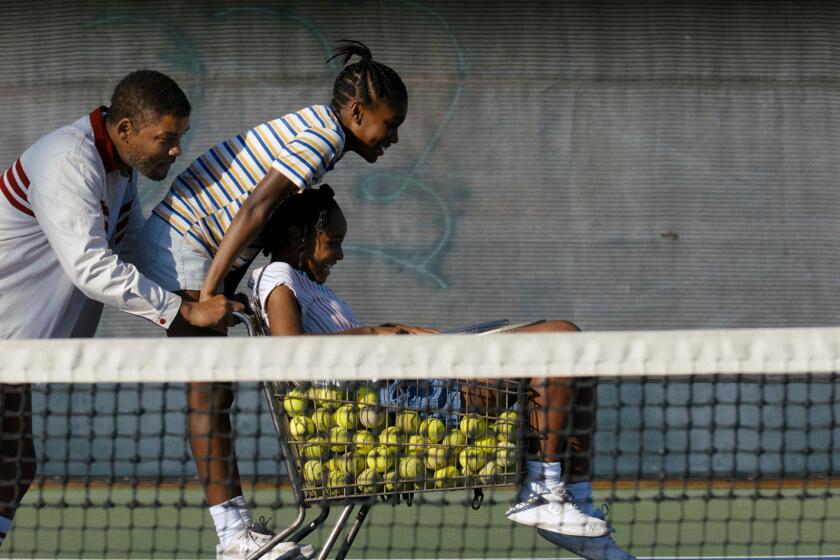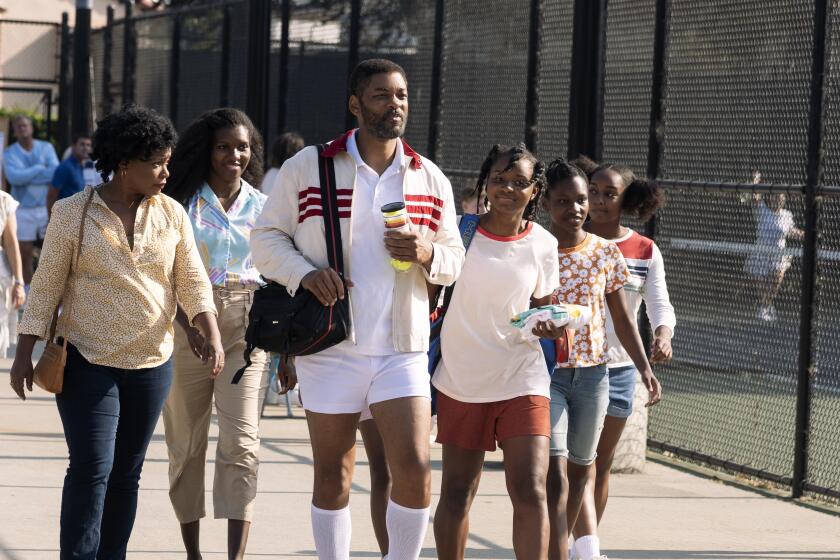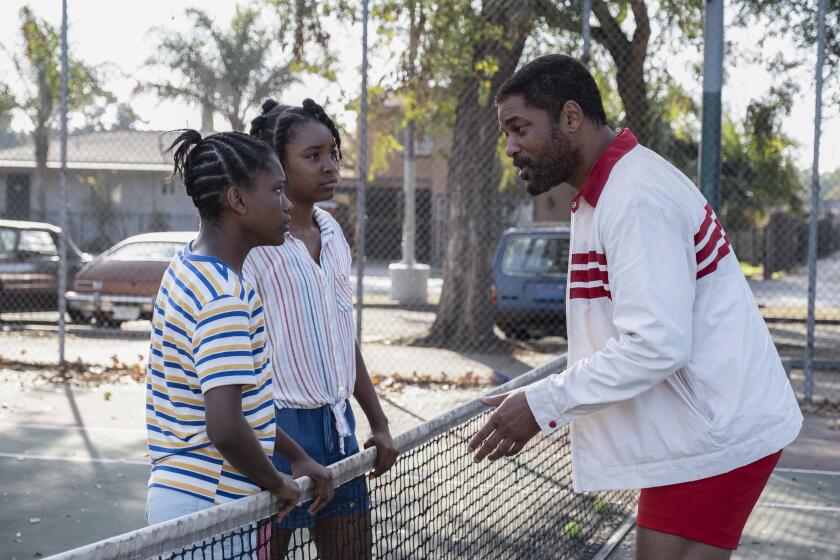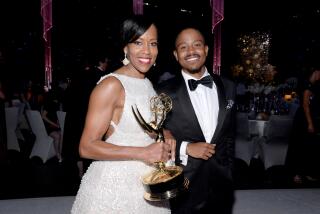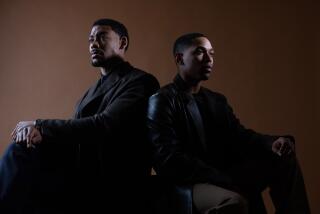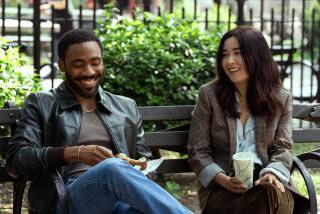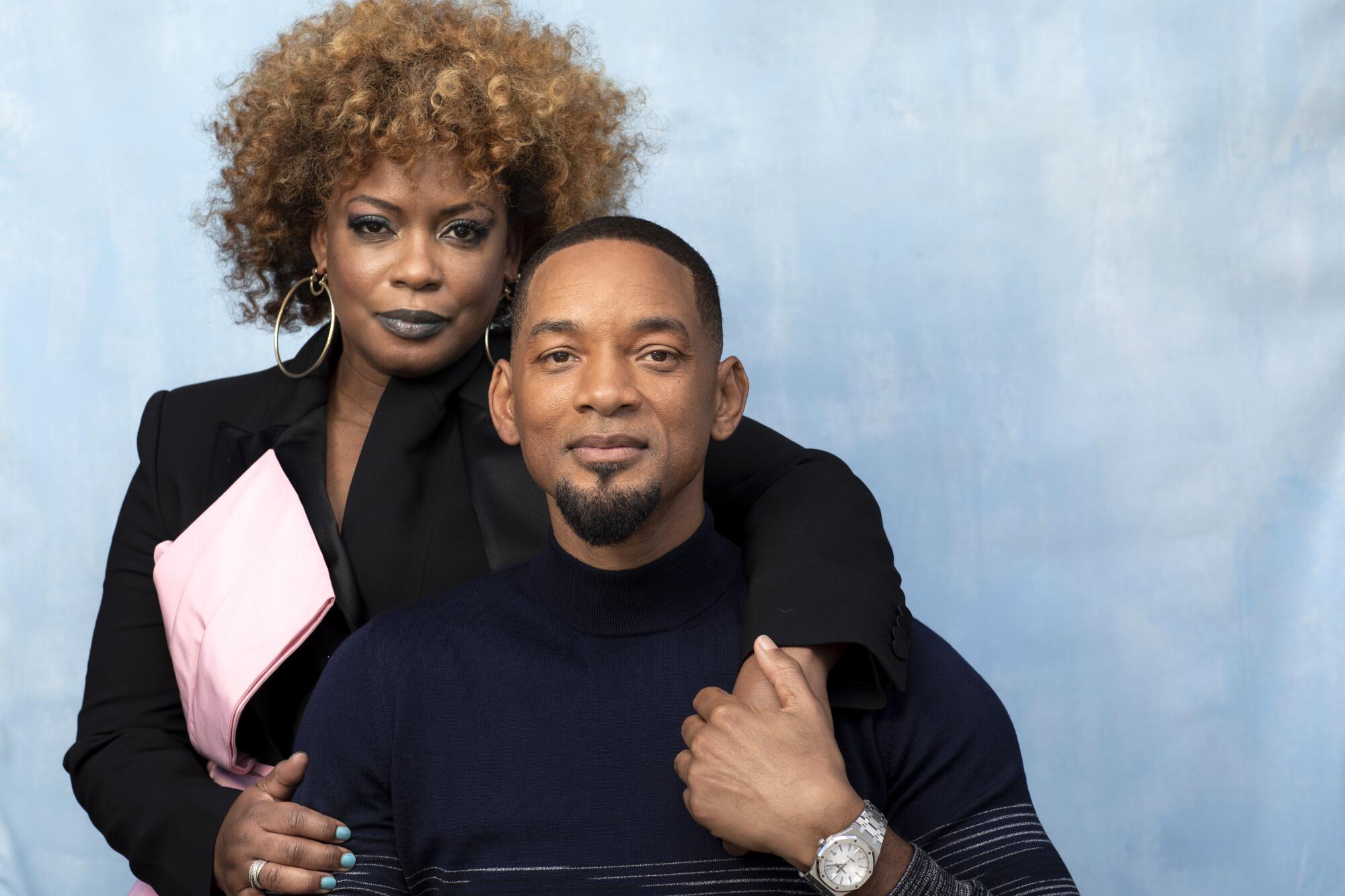
Richard and Oracene Williams, parents of future tennis legends Venus and Serena Williams, are having a fight in the kitchen of their spacious Florida rental home.
Richard is adamant that Venus needs to have as normal a childhood as she can when she’s not training. Oracene supports her husband, but she also lets him know — with devastatingly clear-eyed delivery — how his self-righteousness prevents him from really hearing what his daughters, and his family, need.
It’s a scene that gets to the heart of Reinaldo Marcus Green’s biopic “King Richard,” starring Will Smith as the charismatic but controlling Richard and Aunjanue Ellis as the more reserved but equally formidable Oracene. And the staging reveals how deeply embedded the two veteran actors were in their real-life roles.
“It’s funny because it was supposed to happen anywhere else except the kitchen,” said Green over Zoom. “[The crew] had designed the house, but the kitchen was a no-fly zone because we didn’t have it period-correct. And of course when the actors came in, the first thing they do is go to the kitchen. It was like ‘forget production design at this point, it’s an amazing moment.’ We’ll figure it out in post.”
Director Reinaldo Marcus Green felt a personal connection to the story of Venus and Serena Williams’ childhood in “King Richard.”
“Rei was like, ‘OK, wherever ya’ll go, I’ll just keep following,’” said Smith with a laugh.
It’s also a moment that reaffirms the Warner Bros. release, in theaters and on HBO Max beginning Nov. 19, is fully invested in shining a light on the family story at the root of two women who would ultimately claim their places as all-time greats in the tennis world.
“Listen, they got it right,” said Isha Price, another of Williams’ daughters and a producer on the film. “Daddy was a visionary, he really was. But everybody needs a kick in the pants every now and then, and that was my mom for my dad. So Aunjanue got that part right, because it’s challenging sometimes to get the voice of the quietly passionate person.”
“She really added a tremendous amount of depth to her character,” said Green. “She’s a force to be reckoned with. And once Will put on those short shorts, it was game over. He’s able to really add a lot of flavor to the character based on his own comedic timing. Will gets to be a little bit of Will in there while he’s disappearing into somebody new.”
The Times caught up with Smith and Ellis to discuss the nuances of Black parents and partners, portraying living icons and finding the emotional truth of Richard and Oracene’s relationship.
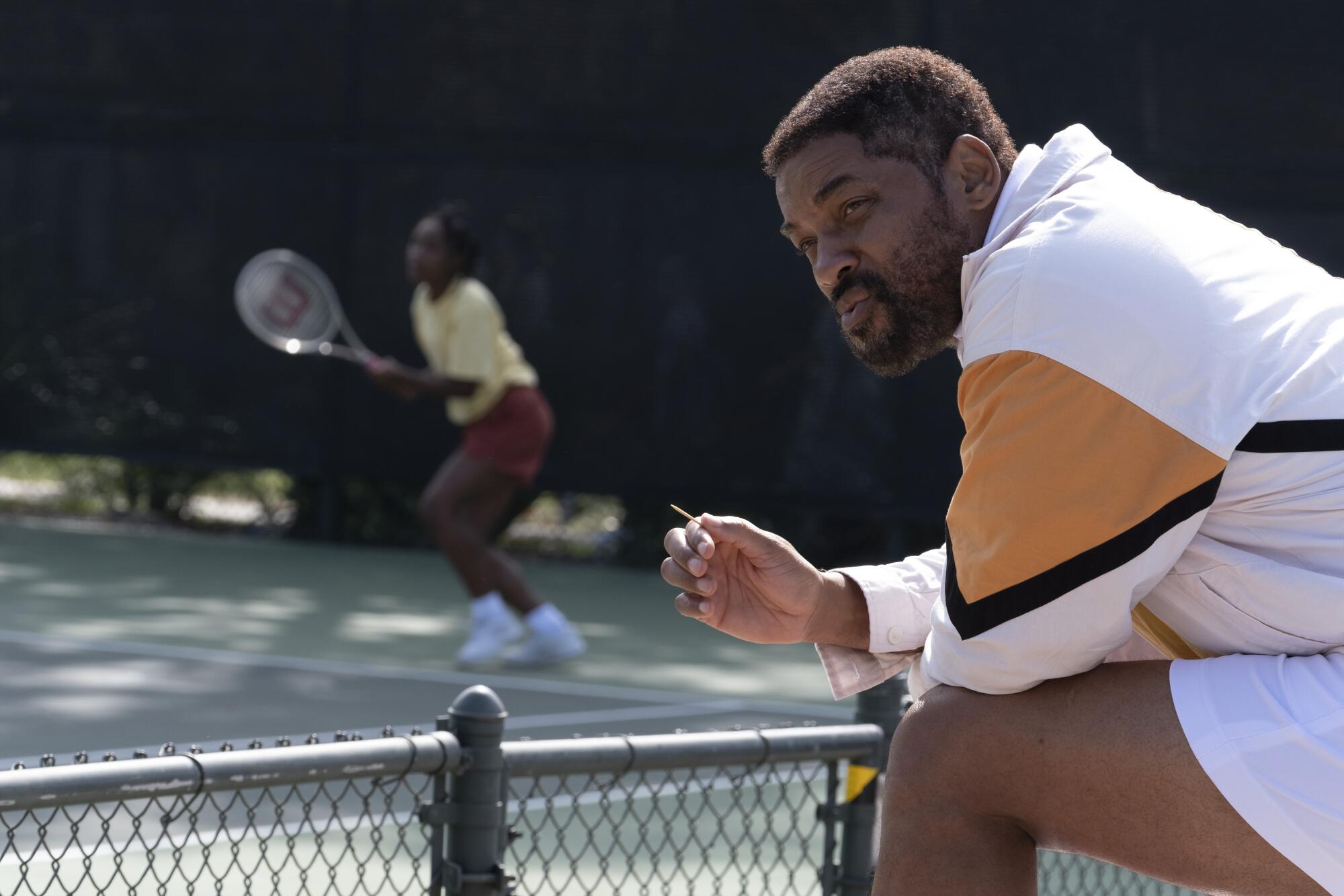
What attracted you to this role and this story?
Aunjanue Ellis: Venus and Serena are heroes of mine. I’m not particularly a tennis fan, but I am a fan of Venus and Serena. What they have done for the sport of tennis, that’s one thing. But what’s so singular about them is that they are the embodiment of liberated Black womanhood. You have an industry that is largely white, patriarchal and misogynistic that has tried to police their genius and they haven’t been able to.
Will Smith: Like the rest of us, I’ve been following their careers for years. There was an interview with Richard and Venus — we depicted it in the film — where he interrupts the interviewer who keeps grilling her about her confidence. And it really struck me. I didn’t totally know what it was at the time, but I just remembered how Venus’ eyes [hid] a little smirk, like she had a lion [on her team] and her lion would kill somebody to protect her. There was a certainty and a confidence in her in that protection. And I remember at the time thinking to myself, “I want my kids to have that look in their eyes when I show up.”
Richard had been villainized and vilified so much in that world but I remember feeling something different was at play. As an actor I was excited to be able to explore [his] life, motivations and traumas and to really retell the narrative to transform [it] because the [truth] is really in Venus and Serena’s eyes. They love their father, and you don’t get that look if your father is a villain.
Aunjanue, what did you draw on for the role?
AE: Ms. Oracene is very different from me. She is very reserved. The word that my director used all the time was “poised.” And all of that stuff is rooted in her religion. She’s a Jehovah’s Witness and how she deals with her husband and how she articulates her emotions throughout the day is very much informed by a religion that’s very patriarchal, so you have to be really conservative about how you present when you are with your husband and with men period. That’s the opposite of who I am. But at the same time, she was very much someone that I relate to. All of these women, particularly Black women, who hold the weight of communities and families on their shoulders without any sort of ceremony or credit [feel familiar]. Ms. Oracene is extraordinary but she’s not rare, so I had a lot of folks to pull from.
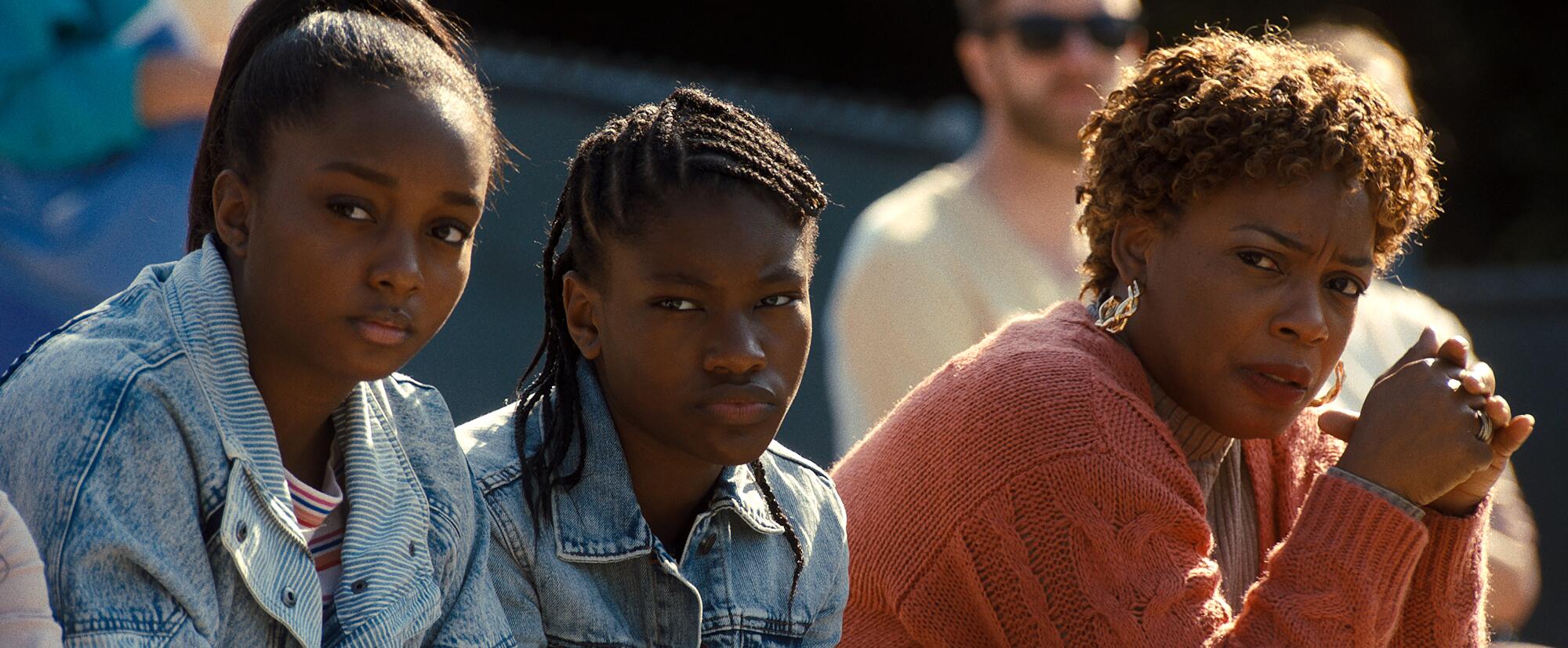
How did the two of you find the emotional truth of Richard and Oracene’s partnership?
WS: The first part was [sitting] down with the whole family to try to get a sense of how the dream came about. Richard came up with the dream and Oracene signed on. I kept asking her, “How? How did he convince you that you were going to have the No. 1 and No. 2 greatest tennis players of all time?” And the thing that stood out was the power of Oracene’s faith and her centering of God in the unity of the familial group. She said, “I answer to someone higher than Richard Williams.” It wasn’t Richard Williams’ plan as much as she felt like it was ordained. So that gave me an in to the roles that they played in this gigantic, fantastical dream.
AE: Right, I love the idea that they’re co-conspirators. I think at the time they were just equally crazy. And he presented that manifesto to her, or however it went down, and she was like, “OK cool. Bet.” I just think it’s magical that these two people found each other to construct this dream for their children.
Crowd-pleasing drama ‘King Richard’ could earn Will Smith his first Oscar, playing the father of tennis superstars Venus and Serena Williams.
There aren’t a lot of nuanced portrayals of Black marriages and parenting. What was important for you to get right?
AE: What you just said, the nuances. Because there’s a way to tell this that’s very broad strokes. I understand the basic feelings that Ms. Oracene had: feeling overlooked and misunderstood, wanting to be a protector of her children. But she expressed those feelings in a very specific way, and that was really central to her faith. Also, every marriage is a culture so you want to do this in a way where we paint a picture that’s specific to that family. Right, Will?
WS: Yeah, nuance is a really good word. From Richard’s side, it was the contrast of being this wild, beautiful, loving dreamer but being a deeply flawed human and how that manifests itself in marriage, family and relating in general. A lot of my friends and I have had discussions as fathers and husbands about how different a thing that is. You can be a horrific husband and a spectacular father or vice versa. It’s usually not the other way around but the styles of relating are very, very different. Richard Williams was much better as a father than he was a husband.
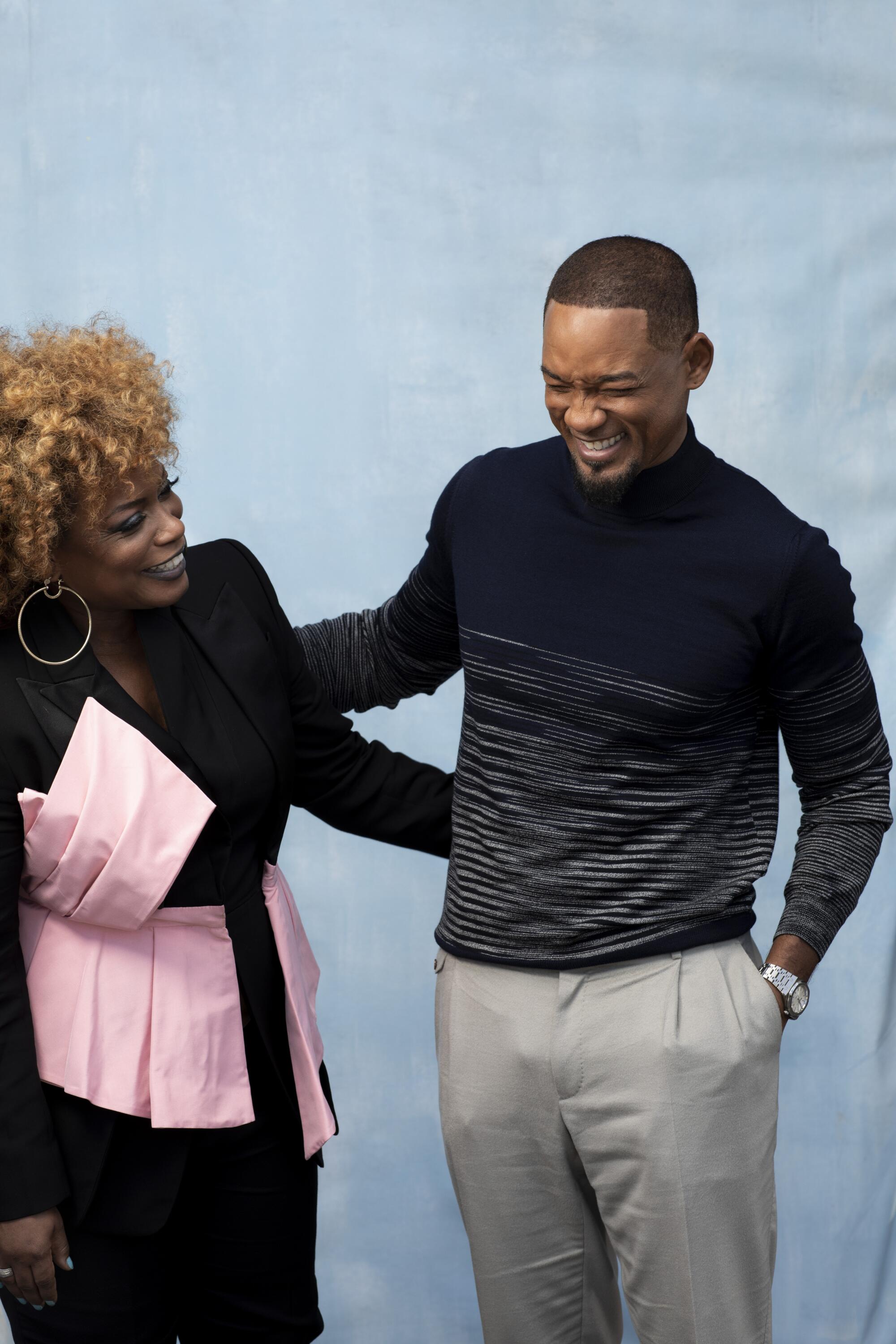
Will, you speak about your relationship with your father in your memoir. To what extent do you feel that Richard’s approach to parenting is similar to your own father’s? What was it like stepping into that mindset and outlook?
WS: I could understand Richard because he was very similar to my father. As I tried to decipher what drove Richard, I found that it was very similar to some of the things that drove my father; that post-World War II, “pull yourself up by your bootstraps,” disciplined [mentality held by Black men from] Jim Crow through the civil rights movement. These were guys who had very few helping hands. For the most part, no one believed in them. And the kind of endurance that has to be cultivated to build the things that they were able to build in the face of constant brutal opposition really creates a certain type of fortitude. And I was able to understand interacting with daughters, which is very different than interacting with sons, through my interactions with Willow. It just opens you up in a different way.
AE: Will you said something yesterday that I thought was really, really interesting about aligning yourself with your children. Can you say that again? Do you remember what you said?
WS: Yeah, that was one of the major differences between my father and Richard Williams and a transition that I had to make in my parenting. [Going] from demanding that your children be the thing that you need them to be for your [own] vision and demanding that they behave and show up in a way that gratifies your sense of self versus aligning with your children’s views and impressions of themselves; aligning with what they desire for themselves.
That’s what Richard Williams was able to do with Venus and Serena and really all of his daughters in that house. He aligned with the sense of what they wanted to be. Even the scenes where he’s like, “Oh, you want that house? What do you want?” He was constantly trying to understand and tap into what they wanted, so he could align [his] push and energy with their impressions and visions and dreams for themselves.
To what extent do you think your more understanding and lenient approach to parenting is a reaction to how you were raised?
WS: Yeah, for sure, it certainly was. I definitely got the father and mother and grandmother that I needed. There was a military style to my father’s parenting that I embodied for myself, but I found it to be less successful with my children. I made a quick pivot to what I call the gardener-flower style of parenting, where I see my kids as seeds that have already been divinely programmed to be what they are. They already are a thing, and it’s my job to nurture the seed so they can grow into the thing that they have been pre-programmed to be, versus me demanding that they grow into an image that I need. I think that was the major difference between my father’s style of parenting and my style.
At what point did you make that pivot?
WS: I always say [my first child] Trey got the most ignorant version of my parenting, and then Jaden got Will Dad 2.0. Willow got the most evolved version of my parenting. Willow kind of saved me because I was about to triple down on my perspective, but Willow really reached me with the idea of being down with her on her journey versus her being down with me on mine.
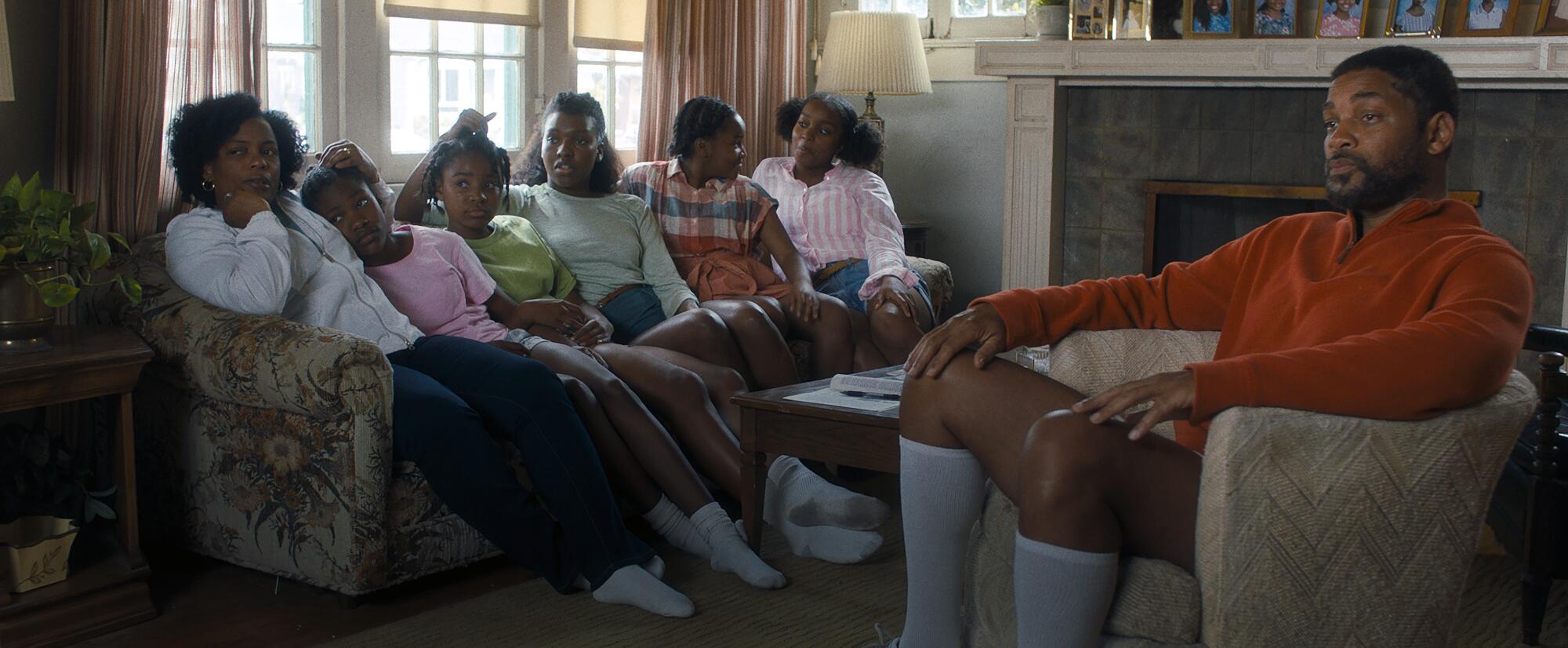
What was it like digging into the more complicated aspects of marriage and partnerships, in particular the disagreements like in that kitchen scene?
AE: You know, it’s funny. I’ve been thinking about this and I did not realize that we never talked about that kitchen scene. Someone asked, “What was it like preparing for that?” And I had to be honest and say we didn’t prepare for it. We just made sure that the words we were saying to each other felt honest and like something that we could live in while we were doing it. That demands a whole lot of trust and a whole lot of two people who know who they are in that moment.
WS: Absolutely.
AE: Like Will being certain about Richard Williams and me being certain about Ms. Oracene and just being able to come into the room [like] “let’s see what happens.” I think Rei trusted us a lot, right Will?
WS: Yeah. Those are the critical scenes that are the major pivot point for the characters. So generally you want to shoot those later in the schedule, and I think that’s what happened for us. We got time to live in the characters. We had months and months, we even had the COVID shutdown [in March 2020], so we had time to let the characters marinate so we understood what these people were going through. I remember I was terrified that day because we didn’t have it. I generally like to be thoroughly prepared and rehearsed when we hit the set and we had to find that scene on the day. And it just came alive.
Standout performances give the Telluride Film Festival new life: Kristen Stewart in ‘Spencer,’ Peter Dinklage in ‘Cyrano,’ Will Smith in ‘King Richard’ and Simon Rex in ‘Red Rocket.’
What’s it like embodying somebody who’s still living and present to judge your work?
WS: It wasn’t just the person living, it was his entire family. It was six women that were being depicted. So it was quite daunting for me. And strangely enough, Richard’s opinion was the least scary to me because I felt like I understood him and was confident that he would feel that I did him justice. But I was deeply concerned about Ms. Oracene and Venus and Serena and the girls. I was deeply concerned that they [would feel] that they were captured and depicted authentically and lovingly.
AE: You can’t think about that when you’re doing it because you’ll end up playing a result rather than playing, period. We’re not doing a re-creation of something. At a certain point, there’s the facts and then the make-believe starts and that’s where my job begins. Those facts, that history is the root of what you do but my job begins in building a character. I had to build a character of Ms. Oracene. And you pray that that works and that they don’t see something that’s a mockery of who they are, they see something that feels like the truth to them. So the fact that Serena and Venus and especially Isha, who was on set every day, are standing with us and standing for the film is an affirmation.
More to Read
Only good movies
Get the Indie Focus newsletter, Mark Olsen's weekly guide to the world of cinema.
You may occasionally receive promotional content from the Los Angeles Times.
